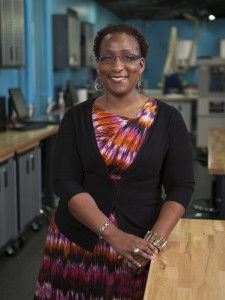Sitting on a discussion panel addressing 300 8th grade girls, Dr. Rabiah Mayas first realized her own importance in the impression of who a scientist is. “I have the privilege of being one model of scientist that looks different for our kids; beyond Einstein, beyond a lab coat, it’s all these other things,” Dr. Mayas noted. The “Futures Unlimited” panel, held at Oakton Community College, featured women scientists from many disciplines discussing their careers and lives. Girls in attendance, as well as adults, said that they had never seen so many female scientists gathered together at one event.
Rabiah Mayas is currently the Director of Science and Integrated Strategies at the Museum of Science and Industry (MSI) in Chicago. Her team evaluates the learning and experience outcomes of the museum’s programs. They develop programs that connect audiences to practicing science professionals in the Chicago area. The museum is a lead partner on an NSF grant exploring whether arts-based practices help spark creativity in innovation and science education; Dr. Mayas also manages the project for the museum.
Arguably the coolest part of Rabiah’s work is running MSI’s digital fabrication laboratory, or Fab Lab. She organizes programs for participants to design anything from a vinyl sticker for a water bottle to a 3D model of their own head. In one session, lasting from 20 minutes to 1 hour, the participants design their object of choice, program the fabrication machine, and receive the output.
Though Dr. Mayas loves scientific research, she characterizes her move to the Museum of Science and Industry as “an opportunity that presented itself that just didn’t have that component.” Rabiah and her team think scientifically and identify a solution to the question at hand, even if they’re not always involved in scientific research. Along with thinking scientifically, Rabiah is not afraid to fail in her work. She sees failure, learning, and iteration as natural and necessary. “I fail often and publically and loudly because I think that’s the only way to do it and the best way to learn from it,” Rabiah said.
One notable failure was an event that Dr. Mayas organized during her term as Science Director with Science Chicago, a year-long initiative promoting science in the community. The kick-off event for Science Chicago, featuring an internationally known scientist, drew a crowd of only 120 to an auditorium that sat more than 800. What did Rabiah learn from that failure? That the content can be splashy and cutting-edge, but it also needs to be accessible and appropriately targeted to participants. This lesson carries over into Rabiah’s current work, from naming the MSI programs to providing transportation to featuring a relatable speaker.
Rabiah has always been heavily involved in science-related community outreach and volunteer opportunities. Through a program during graduate school at the University of Chicago, she partnered with a Chicago Public School biology teacher to enhance the programming in the teacher’s classes. They ended up working together for a year, which included a visit to the laboratory by the CPS students. Dr. Mayas also “borrowed equipment from the lab to take to the class, which I’m pretty sure I didn’t ask permission for.”
Medicine was Rabiah’s first love of science because she was fascinated by the complexity of the human body. Currently, she follows stories about space exploration closely, especially regarding astronauts or Mars rovers. The @SarcasticRover Twitter feed is a personal favorite.
“I aspire to be balanced in a way that is very natural and it doesn’t feel like I’m fighting for balance,” Dr. Mayas says. To that end, she’s an active runner, with a plan to participate in a marathon next year at Mt. Kilimanjaro. Rabiah loves to dance and dreams of being a contender on a “Dancing with the Scientists” reality show. She’s also recently taken up photography.
At work, Rabiah is challenged to prioritize the projects that her team works on. “Our team comes up with great ideas every day and there isn’t the time or resources to do all of them. I think in [Chicago] where there is need and demand for really great science opportunities, having to say no to things is really hard.” Rabiah’s personal challenge is to incorporate an active science practice back into her career in the future. She jokes with friends and former colleagues that she’ll show up in the lab unannounced one day, wielding a pipette.

